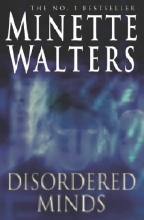Disordered Minds
Minette Walters
Macmillian
UL Trade Paperback
ISBN: 1-405-03417-3
423 Pages; £10.99
Publication Date: 11-15-2003
Date Reviewed: January 13, 2004
Reviewed by: Terry D'Auray © 2004

REFERENCES
COLUMNS
|
|
|
Disordered MindsMinette WaltersMacmillianUL Trade PaperbackISBN: 1-405-03417-3423 Pages; £10.99Publication Date: 11-15-2003Date Reviewed: January 13, 2004Reviewed by: Terry D'Auray © 2004 |
|
|
REFERENCES |
COLUMNS |
Minette Walters published her first suspense novel, 'Ice House', in the UK in 1992. Her second, 'The Sculptress', published in the UK in 1993, won an Edgar for best novel. With the publication of her many subsequent titles, she has been christened the UK's premier mystery writer, combining the psychological suspense of Ruth Rendell with the literary writing finesse of P.D. James. 'Disordered Minds' is her 10th book in as many years and, truth be told, her narratives are trending off course. Formerly taut, suspenseful, resting on believable but aberrant psychological and social underpinnings, her novels are becoming increasingly overcooked, ever more mushy and flavorless.
'Disordered Minds' is the story of two 30-year old crimes that occurred in the small town of Dorset within a weeks' time: the brutal and bloody murder of a handicapped grandmother in her home and the gang rape and subsequent disappearance of an abused and troubled Dorset teenager. Howard Stamp, a disfigured and outcast teen, under duress from the local police, confessed to the murder of his grandmother. Despite inadequate evidence and the subsequent retraction of the coerced confession, Stamp was convicted and imprisoned and shortly thereafter committed suicide. The disappearance of the teenage rape victim was never resolved. Some thirty years later, George Gardner, a 60-year old local councilor, and Jonathan Hughes, author of a book on historical miscarriages of justice, team to revisit these crimes and uncover the truth. George and Jonathan are an unlikely pair, she an overweight, lonely woman leading a solitary and empty life, he an abused black scholar with a massive chip on his shoulder. What begins as an antagonistic and adversarial relationship between George and Jonathan rather quickly evolves into a mother-son, shrink-patient pairing right out of the soaps.
Wending its way here, there and everywhere to uncover the real doings of a sprawling cast of parents, siblings, schoolmates and workmates, 'Disordered Minds' ambitious plotting covers a lot of territory. With so much exposition to get before the reader, Walters resorts to extensive use of faux newspaper articles, police reports, letters -- and of course, emails -- and even edited chapters from Jonathan's book, to set out the conflicting details that must be unraveled. These frequent inserts read like commercial interruptions, diminishing the force and pace of the core narrative. The reader is tempted to skip them, but knows they can't -- this is a mystery and there are likely clues within.
The psychological parallels between Howard Stamp, unjustly accused of murder, and his champion, Jonathan Hughes are evident -- abusive childhoods, physical disfigurements (Howard has a hare lip, Jonathan is black, which in Walters' novels is frequently the mark of a social outcast), result in ill-formed and unconfident identities. Rather than allowing these parallels to subtly inform her characterizations, Walters wields a heavy hand, rehashing and reframing them with theories, social psychology and pseudo-scholarly analysis. The emotional power suffers and tedium takes over.
Walters' bag of literary tricks has served her, and her many readers, well for many years. Eschewing the Rendell/James series-character path, she creates stand-alone novels unified by common themes. Her stories center around characters who are social outcasts, misfits who are psychologically and often physically scarred by abuse. She has ably created some memorably disturbed and uniquely offbeat characters -- Olive Martin, the obese imprisoned ax murderess in 'The Sculptress'; the lesbian "witches" in 'Ice House'; Mad Annie the elderly black woman with Tourette's Syndrome in 'The Shape of Snakes'. Uncovering the truth behind the murder (or multiple murders) in each of her books leads to the exposure of the seamier and squalid activities that live just below the social surface -- alcoholism, incest, pedophilia, rape, abortion, pornography and drugs. Walters' themes are grim and real, her eye for social inequity strong and unyielding.
Walters is equally adept at writing from a "procedural" or "amateur sleuth" perspective with protagonists that are either British police or normal, everyday people, frequently writers or physicians, caught up in a disturbing series of events. With her complex and convoluted plots, Walters smoothly mixes the prerequisite red herrings with meaningful clues in a trail of crumbs that snakes, zigzags, and veers through layer after layer of deception and misdirection. Readers who relish solving the puzzle are given a fair chance, while those who don't care to figure out whodunit on their own are amply rewarded with a satisfying, if complicated conclusion.
Walters' books have consistently been overpopulated with scores of characters. Some stay to play a part in the action, some circle around the primary action but make no contribution to either the conclusion or the depth of the narrative, and others, well, they simply disappear. A reader could easily find himself longing for a mental Rolodex when reading a Walters' novel.
In her earlier works, Walters controlled her dense and convoluted plots and expansive casts with a sure hand, building tension and suspense while revealing misguided motivations and ugly truths. She created memorable and sympathetic characters cast out from the world and unjustly suspected, abused and often punished for their natures, not their actions. Always dense, always meandering, the early Walters books satisfied with well-observed psychological portraits packaged in untidy, but realistic and suspenseful narratives. 'Disordered Minds' suffers simply from the "toos" -- too much plotting, too many inconsequential characters, too much extraneous fluff, too much repetitiveness and far too little tension. Readers looking for a taste of the Walters magic at its best should try 'Ice House', 'The Sculptress', 'The Scold's Bridle' or even the fairly recent 'Shape of Snakes'.